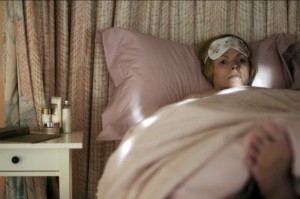Aesthetica Short Film Festival 2014 — Reviewed
Promoting avant-garde filmmaking, encouraging audience critique, and reminding us of the pure joy of a projector and popcorn, ASFF injects fresh faith into our relationship with cinema, finds Joshua Potts…
It’s barely midday, and I’ve just seen a man pull a gun out of his chest. His fingers are thick with blood, his face tightened in agony, as the camera hovers uncomfortably close to the gruesome operation (perhaps closer than my half-digested tuna sandwich can take). At last he discloses a pistol blackened by his insides, cocks it, and aims at another man standing in the corner of the bedroom. A sick smile touches the first man’s lips. He presses the trigger. Nothing happens. “It’s empty,” he gasps.
I have no idea what’s going on. I arrived late for this screening and, before I can get my thoughts together: cut to black. People in front and behind me laugh and squirm uneasily, the sound like eddying pond water. A few leave, but the vast, vast majority stay. They have stalkers and devil-spawn yet to see.
This is Aesthetica Short Film Festival’s (ASFF) fourth year, and it is no longer an upstart on the UK’s film circuit. It has pedigree. It has scope. It has York as its playground, which means you could quite happily stick a lot of its venues on a postcard. ‘Sorry for your loss’ could be the accompanying sentiment to sum up the experience of not being here for anyone who has even a passing interest in grassroots auteur-ship. This four-day event is about being heard. Hotels, museums, theatres and a university are the arenas of discussion. Or just about anywhere, really.
York’s long, cobbled avenues and quaint market places are teeming with filmgoers wearing bright yellow lanyards around their necks, some of whom look lost and wide-eyed on their travels, stumbling into locals with the sincerity of avid explorers.
Ask York folk what they think of the whole thing and they’re quite bemused. The woman serving me in Greggs certainly likes sharing “oohs” and “ahhhs” over the counter. She must have noticed ASFF before, no? Quick consultation with her colleague, who’s painted himself as Pudsey Bear. I suppose local pride takes on all the forms it can.
My first breathless visit to a screening (there are six films in each slot, totalling anywhere from 45 to 90 minutes) is off the beaten track – St. Margaret’s Church, on the farthest right flank of the city’s festival grid. Viva (2014, above), a profile of octogenarian punk singer Viva Hamnell from director Amanda Bluglass, is in its closing moments. “I said I thought they were tomatoes,” says its twinkly-eyed star when asked about being busted for cannabis at the age of 46. “I was gonna feed them to my goats.” ‘Viva’ is the Latin verb ‘to live’; watching Hamnell bumble around in a floral dress, getting ready for yet another Glastonbury, is a touching salute to joie-de-vivre that couldn’t be a better introduction for ASFF’s commitment to the unexpected.

Dark comedy Dogging (2014) — from directors Matthew Reed and Sam Turk – will later be the yin to Viva’s yang, taking us into the backseat of a car where a middle aged couple are desperately, incompetently, attempting to spark up their marriage with a bit of outdoor recreation. The wife is keen, the husband not so much. A farce ensues as they bicker over the correct sequence of flashes that’ll advertise their horniness to an adjacent Land Rover. Turns out the other driver is trying to kill himself. It doesn’t stop the clueless husband from masturbating in the stranger’s window, indicting the most pathetic of transgressions in the process.
One pleasant surprise is Thirteen Thirty One, tucked on the corner of Grape Lane. It is a bar and part-time cinema with futurist, high-backed chairs and a cosy smoking area. During the festival’s Drama No.12 slot, the building’s upstairs lounge is so packed that I’m forced out into the crisp night air, not wishing to disturb an audience enjoying the beanbags dotted about the floor. Drama probably pulls the biggest crowds. Next would be comedies or thrillers, but the line between them is often blurred, as in James Sharpe’s Fibs (2013). We follow a girl through a tinted costal town, across an isolated pier, wind-whipped and heartbroken. Is she really pregnant? Sharpe’s delicate direction combines the half-known fantasies of adolescence – a standout sequence shows beach grass sprouting around our protagonist’s bed – with a gently sighing score, all the stronger for allowing its actors to communicate with silences. The film’s landscapes are its emotional axis.
Ditto two documentaries examining our growing distance from nature, Gyre: Creating Art From A Plastic Ocean (2013) and Still Life (2014). The former records a team of scientists and artists in Alaska tasked with gathering plastic waste for an unprecedented exhibition on the theme of the environment’s ongoing destruction by humanity. Some choose a raw, unvarnished approach; others seek to make waste seem otherworldly, “as if it was deposited from space”, like a clutch of futureless obelisks. The brains behind this cultural archaeology, however, can still be reduced to tears at the entrance of a mother bear and her cubs amidst the trash-marked wild. Still Life opts for artifice over realism, painting the twilight world of a forest as a dream of texture and mystic suspension. Never has a flock of ducks on a lake looked so Nietzschean. An owl finally turns its head, shadow spilling across its dilated yellow eye, and it’s difficult to suppress a shiver.
Clearly the epic and the intimate strike a balance across ASFF’s exhaustive programme. Short filmmaking is an increasingly ambitious industry, a kind of launching pad (or test site, if a director’s vision goes nuclear) for invading the zeitgeist and – whisper it – the multiplexes. With David Cameron urging UK films to focus on their commercial prospects above all else, and traditional production companies hesitant to back anything daring or off-kilter, it’s tempting to envisage the indie movie as a drowning man beating at his own reflection.
Yet Miranda Flemming, producer for crowd-funding platform Indiegogo, tells me the opposite is true. I manage to catch her for a quarter of an hour before she gives a talk to a group of hopefuls who may or may not place their careers in the hands of the public.
“I wouldn’t put anything in a box,” she says, somehow composed and eager to explain herself. “Niche films can do incredibly well, especially with our crowd-funding model. They have big, passionate audiences.” Flemming could be referring to some of her ongoing projects, like the sequel to Nazis-on-the-moon caper Iron Sky, or the recent success of her competitors, such as Kickstarter campaign leading to Veronica Mars’ theatrical release. Miranda is confident that the debate about how we watch movies extends into how we make them; that democracy in the creative sector places added importance on the short format.

“When I came out of working for the UK Film Council, I found traditional producing had become incredibly difficult. The market had collapsed. For me, what’s significant is a change in the business model. Ten years ago, you’d enter a short into about 20 competitions and bank on £10,000 from winning prizes. Now, they’re a director’s first tool in gathering an audience for their feature. It’s an established ecosystem. And the best thing is, you can’t manufacture a response – you have to just put your film out there.”
Since we’re talking about shorts with greatness in their DNA, Keeping up with the Joneses (2013) might be lead contender for the festival crown (in fact, it takes home Best Thriller at the ASFF Awards). BAFTA-nominated Michael Pearce’s elastic thriller stars Maxine Peake as a closeted victim of the suburbs, distanced from a husband who owes money to some very bad people. When two men (Geoff Bell and Utopia’s Andeel Akhtar) knock on her door demanding to see him, lives are upturned in a series of brisk, believable revelations and psychological switcheroos. Peake plays the privileged martyr with quiet dignity, while her co-leads riff off one another like Pulp Fiction’s hit-men shoved through a Primark queue. It manages to discuss class, identity and the inherent question of happiness, whilst also being incredibly funny. Typical exchange: Akhtar’s character, Jerry, is shouting at a fast food worker to put a hairnet on his moustache. The worker is dressed as a chicken. “I don’t want your fucking face hair in my food!” Jerry spits. The accused relishes the importance of his reply: “I don’t make the chicken . . . I am the chicken.” Smack. Chicken Guy is nursing a black eye.
I can’t help but agree with Miranda Flemming’s assessment that a lot of us are searching for sharper shocks in world where Hollywood is content to churn out stagnant, boring, bloated excuses for popular entertainment. She cites Breaking Bad and other top drawer television as ring-leaders in the fight against storytelling-by-committee, but hopes short films can ride changing trend in consumption. “The multiplex and the indie mentalities are moving ever further apart. Somebody at the Toronto Film Festival earlier this year shouted to the audience, ‘You fools! You’ve given our film language away to TV!’” While this may be the case, I’m reminded throughout the day just how willing ASFF’s crowd is to enjoy the old-school pleasures of darkness, a projector, and some terrible seating plans.
Most of the people here are young, radiating opinion. Each screening ends with the hum of chatter and analysis. At Gently Gently (2014), one female audience member proclaims her anger at the sudden denouement that leaves our heroine at the mercy of her sinister friend and a large kitchen knife. Bad Day at the Office (2013) gets the biggest laugh: an office drone is awoken to the impact of a swinging log on his testicles. He screams in pain, and a cheerful voice, straight out of a self-help manual, perks up. “We all feel like this, don’t we? Sometimes life just kicks you in the bollocks.” In a minute or two, more office lackeys emerge from their cubicles to the drums of war. The film portrays normality as masochism; in an inspired visual gag, we get a glimpse of this fictional company’s Employee of the Month sheet, a gallery of ever-more-crippled go-getters preparing for a long hospital stay.
Not all the shorts are successful. Thriller Newborn (2013) settles for the aesthetic of a sub-standard B-movie. UK/Polish production Persistence (2012) pitches itself as a tragic study of a village occupied by German forces in WWII, but often fails to seem much more than lads mucking about in a field. And Priyanka Chhabra’s A Summer Flu (2013) is interminable, falsely presuming shots of white walls and soliloquising Indian children equals profundity.
Still, the ten or so hours I’ve spent wandering this city have injected fresh faith into my relationship with cinema. Under Aesthetica Short Film Festival’s banner, and in this format, the purity of storytelling can remain on its plinth, gaze upon the masses, and invite them up for the view. That our filmmakers need us as much as we need them – to transcend, to dream, to poeticise our existence – is a comforting thought. A triumph.
Joshua Potts
See the full Aesthetica Short Film Festival programme here
Read Joshua’s pre-festival highlights here





